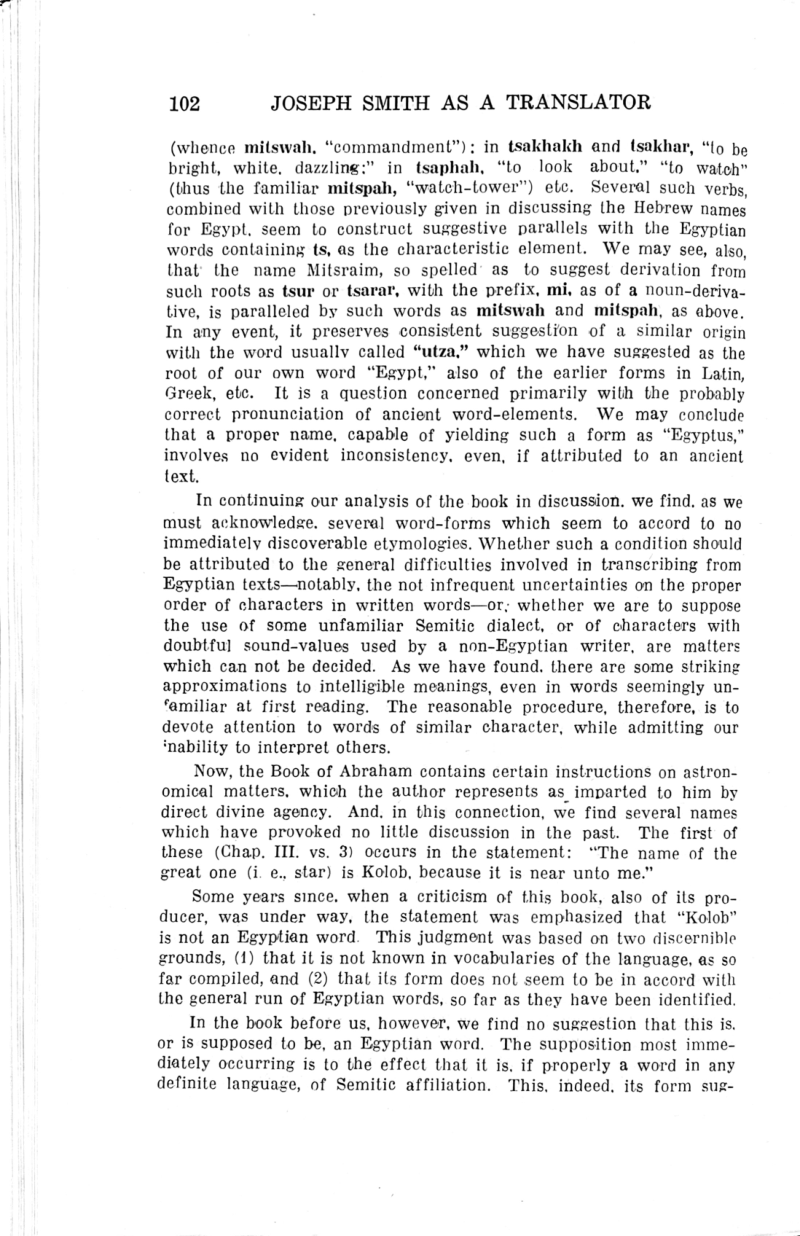RCW/JEH discusses possible etymologies for the name Kolob; defines Kolob as a star.
- Type
- Book
- Source
- James E. Homans Non-LDS
- Hearsay
- DirectSecondary
- Reference
R. C. Webb [James E. Homans], Joseph Smith as a Translator (Salt Lake City: The Deseret News, 1936), 102–103
- Scribe/Publisher
- Deseret News
- People
- James E. Homans
- Audience
- Reading Public
- Transcription
Now, the Book of Abraham contains certain instructions on astronomical matters, which the author represents as imparted to him by direct divine agency. And, in this connection, we find several names which have provoked no little discussion in the past. The first of these (Chap. III. vs. 3) occurs in the statement: "The name of the great one (i. e., star) is Kolob, because it is near unto me."
Some years since, when a criticism of this book, also of its producer, was under way, the statement was emphasized that "Kolob" is not an Egyptian word. This judgment was based on two discernible grounds, (1) that it is not known in vocabularies of the language, as so far compiled, and (2) that its form does not seem to be in accord with the general run of Egyptian words, so far as they have been identified.
In the book before us, however, we find no suggestion that this is, or is supposed to be, an Egyptian word. The supposition most immediately occurring is to the effect that it is, if properly a word in any definite language, of Semitic affiliation. This, indeed, its form suggests closely. Thus, we have, familiarly, such words as Keleb, Kalab and Kalbu, with the meaning "dog." The Cuneiform texts contain mention of the Dog Star, Kalab Samsi, "Dog of the Sun" (in reference, probably, to the fact that he seems to follow the sun, as a dog, his master). The Arabian astronomers, also, knew the Dog Star, and applied the word to other stars as well; such as Al Kalb al Akhbar, "the Greater Dog," and AI Kalb at Asghar, "Lesser Dog." The same astronomers used also the word Qalb, "heart" (a word spelled with Qoph, or gutteral "k," in distinction from the other, showing Kaf, or palatal "k"), and applied it in such terms as Al Qalb al Akrab, "scorpion's heart," and Al Qalb al Asad, "lion's heart," etc. Such facts evidence that words closely like the one in discussion have been used in star-names from ancient times.
While these similarities are interesting, it is probable that they have not solved the situation before us, or, in any event, presented it in the light which suggests a solution involved by its possible occurrence in an Egyptian text. Thus, we read, in way of explanation, the clause, "because it is near unto me," which might be held to explain the name of the great star, on the basis of the meaning involved. In following this line of search, we find an interesting—if not a significant—explanation. For, as formerly indicated, there has been, and, to a certain degree, still is, a question as to whether "l" or "r" is to be read in given words, or whether the Egyptian fully distinguished the two sounds. In any event, the same characters have been read, even if not intended, as equivalents for both sounds. In Semitic languages, also, we find words with similar forms and similar meanings, differing only in the fact that one shows an "l" where the other shows an "ir." We shall have occasion to refer to this interchange again; but in the present case, we need only indicate the Hebrew word Qorob, with the meaning "near" or "nigh unto." (The pronunciation indicated by the spelling being. for the first "o," short with qamets, and for the second, long with vav and kholem.]
- Citations in Mormonr Qnas
The B. H. Roberts Foundation is not owned by, operated by, or affiliated with the Church of Jesus Christ of Latter-day Saints.

